|
|
|
Sort Order |
|
|
|
Items / Page
|
|
|
|
|
|
|
| Srl | Item |
| 1 |
ID:
166562
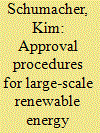

|
|
|
|
|
| Summary/Abstract |
This paper analyses the commonalities and variances of environmental approval procedures in four OECD territories, Japan, New Zealand (NZ), the European Union (EU), and the United States (US). In order to streamline regulatory approval frameworks for large-scale renewable energy (LS-RE) installations, outlining the strengths, as well as the weaknesses of the current systems in place, is crucial in determining what components to alter in line with national and regional particularities. The jurisdictional juxtaposition facilitates the identification of administrative burdens, which could increase environmental review-related costs for developers and prolong the entire approval process. Environmental impact assessment (EIA) frameworks, a major component of the LS-RE approval process, suffer from administrative fracturing between the local, regional, and national levels as well as between various government agencies. In combination with strong reservations from local civil society stakeholders, the results revealed some of the flaws of the current LS-RE project approval systems in place. The EIA frameworks and reform efforts in all four jurisdictions illustrate the importance of consolidated and comprehensive frameworks to reduce the amount of planning uncertainties for developers. Utilising regulatory tools such as mandatory timeframes, scoping, clear screening thresholds and priority assessment categories for LS-RE projects, could result in robust EIA processes based on unified regulatory procedures for climate change mitigating energy projects, inside as well as outside of OECD jurisdictions.
|
|
|
|
|
|
|
|
|
|
|
|
|
|
|
|
| 2 |
ID:
104091
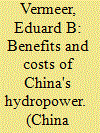

|
|
|
|
|
| Publication |
2011.
|
| Summary/Abstract |
During the past few years, the Chinese government has formulated ambitious plans for building many large hydropower stations, but so far it has withheld final approval for the construction of the majority. The environmental problems and rising cost of coal-fired stations, China's Copenhagen commitment, the creation of a high-voltage national power grid, and the availability of cheap capital should have all worked to the advantage of hydropower. Moreover, present projects require much less resettlement than those in previous decades. However, since 2006 political concern for the social problems of forced migration and distrust of the business alliance between power companies and provincial governments seem to be obstacles. Stricter regulations for environmental impact assessment, more comprehensive planning of water and reservoir use, and a lack of staff have lengthened approval processes. Central and provincial governments do not agree on developmental priorities and electricity prices. Uncertainty about obligations imposed on investing power companies is a factor too. Thus, hydropower policy suffers from conflicting goals and uneven commitment of various bureaucratic interests. Even if a clear policy commitment could improve policy implementation, China's target of 330 GW of regular hydropower capacity in 2020, and thereby its renewable energy target, are unlikely to be met.
|
|
|
|
|
|
|
|
|
|
|
|
|
|
|
|
| 3 |
ID:
127533
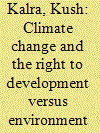

|
|
|
| 4 |
ID:
097428
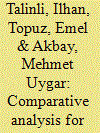

|
|
|
|
|
| Publication |
2010.
|
| Summary/Abstract |
This study presents a comparative analysis of three different energy production process (EPP) scenarios for Turkey. Main goal is to incorporate the prioritization criteria for the assessment of various energy policies for power alternatives, and evaluating these policies against these criteria. The three types of EPPs reviewed in this study are: electricity production from wind farms in the future, existing coal-based thermal power plants and planned nuclear power plants. The analytical hierarchy process (AHP) is utilized to assess the main and sub-factors of EPPs. Main factors such as economic, technical, social and environmental are assigned in first level of the AHP. The importance weights of factors are produced and priority values with realistic numbers are obtained using Fuzzy-AHP Chang's Model. Priority value for wind energy was determined as two times higher than the others when making the ultimate decision. On aggregate, importance weights of environmental (0.68) and social (0.69) factors make wind power leader. Sub-factors such as public acceptance, waste-emission and environmental impacts cause both nuclear and thermal power to have the lowest priority numbers. Additionally, the CO2 emissions trade was determined to be a very important criterion associated with both economic and environmental factors according to Kyoto Protocol. This study concludes that Turkey's existing thermal power stations should gradually be substituted by renewable energy options according to a schedule of Turkish energy policies in future.
|
|
|
|
|
|
|
|
|
|
|
|
|
|
|
|
| 5 |
ID:
133156
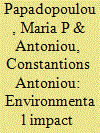

|
|
|
|
|
| Publication |
2014.
|
| Summary/Abstract |
The recent discovery of significant offshore natural gas reserves in the Aphrodite field, south of the island of Cyprus in the Mediterranean Sea, changes the energy landscape in the greater Mediterranean-Middle East-Caucasian Region. In this paper, different alternative locations for the construction and operation of a liquefied natural gas (LNG) terminal station in Cyprus were evaluated, explicitly considering also their connection to the power generation station of Mari and the country×s gateway.
The problem of determining the optimal location for an LNG terminal in Cyprus has been approached using multiple methodological components, which consider environmental and transportation issues, both technocratic in nature, as well as more subjective and based on expert opinion. The first step was a REGIME multi-criteria decision analysis used to prioritize alternative LNG terminal locations. Then, multiple modes (railroad and pipeline) of transportation connections were evaluated and geometric alignments were proposed, considering a multitude of restrictions. Finally an environmental impact assessment based on a structured questionnaire and an expert panel was conducted to validate and assess the impact of the alternative options (combination of location and transportation mode and route). During the evaluation process parameters such as safety, existing infrastructure, and access were also considered.
|
|
|
|
|
|
|
|
|
|
|
|
|
|
|
|
| 6 |
ID:
150884


|
|
|
|
|
| Summary/Abstract |
The local acceptance of wind energy projects has received significant attention because local opposition is a barrier to implementing a wind energy project. To decrease objections from local residents, previous studies identified factors that evoke negative attitudes. However, little research has focused on the acceptance of people who remain silent. Therefore, the situation in which there is no marked opposition has been regarded as a success for the project. This research focused on the acceptance of people who are not objecting to a wind farm in their backyard and clarifies the implications of the silent situation. One of the principal findings is that while most of the respondents accept the existing local wind farm, they have negative attitudes towards a new wind farm. This result means that the silent situation does not support further wind development. We conclude that the purpose of consensus building needs to be set to encouraging local residents to express their opinions instead of simply aiming for the absence of opposing opinions. Finally, we discuss a council model through a budgetary provision, eliciting opinions from people who remain silent, and adaptable management as the policy implications for sustainable wind development.
|
|
|
|
|
|
|
|
|
|
|
|
|
|
|
|
| 7 |
ID:
142082
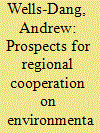

|
|
|
|
|
| Summary/Abstract |
Environmental Impact Assessment (EIA) is a central process in sustainable development to mitigate the anticipated impacts of development projects. Every national government in mainland Southeast Asia has, or is in the process of developing, legislation on environmental governance and shares a common interest in implementing and enforcing EIA. Yet despite the fact that significant environmental impacts occur across borders, no multi-country EIA agreements have yet been passed and implemented. Increased regional cooperation could present an opportunity to address this gap, potentially linked to ASEAN or other regional organizations. Based on this hypothesis, a consultative research process under the auspices of the Mekong Partnership for the Environment interviewed 127 key stakeholders in five countries (Cambodia, Laos, Myanmar, Thailand, and Vietnam) to assess the positions, levels of influence and readiness to cooperate on EIA principles and standards. Using a political economy approach, the research team found strong support among government and non-governmental stakeholders alike for reform of national EIA procedures, increased public participation and the development of regional EIA standards. At present, government officials in some countries favour increased cooperation, while others express reservations and concerns about the value of such cooperation. The article explores the underlying interests and incentives behind these varied standpoints and concludes with a discussion of possibilities for regional institutions, national governments and donor agencies to advance cooperation on environmental governance.
|
|
|
|
|
|
|
|
|
|
|
|
|
|
|
|
| 8 |
ID:
179690
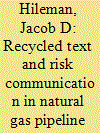

|
|
|
|
|
| Summary/Abstract |
Under the U.S. National Environmental Policy Act (NEPA), energy infrastructure projects that are permitted by federal agencies require preparation and publication of an environmental impact assessment. However, fifty years after the passage of NEPA, agencies’ compliance behaviors, and how these behaviors might shape the risks associated with energy infrastructure, remain largely unexplored. Here, we consider how assessment documents from forty-six of the largest U.S. natural gas pipeline mega-projects address landslide risks. Using a series of text mining and content analysis methods, we evaluate the prevalence of recycled text across assessments. We find that text similarity does not correspond closely to reported risk levels – in many cases, common verbiage is used and only project-specific details (e.g., locations, numeric figures) are substituted. While such approaches likely expedite preparation of assessments and facilitate knowledge transfer between projects, we argue that common text potentially hinders clear communication of differential risks to decision-makers and the public, who may lack the technical expertise to contextualize the magnitude and severity of reported figures. In light of ongoing policy efforts to streamline lengthy and costly energy infrastructure permitting processes under NEPA, it is vital that such efforts do not undermine the risk communication requirements of the review process.
|
|
|
|
|
|
|
|
|
|
|
|
|
|
|
|
| 9 |
ID:
134413


|
|
|
|
|
| Summary/Abstract |
Protests against naphtha crackers have been an important trend in Taiwan’s environmentalism since their emergence in the mid-1980s. This article analyses ten protest cases (1987-2011) to understand the evolution of environmental politics. I draw the following conclusions: (1) with the growing public awareness of pollution, new petrochemical projects are increasingly facing popular opposition; (2) the environmental movement assumes less partisanship, although ideological differences between the political parties still remains; (3) the mobilising capacity of NGOs is on the rise and has become the key factor in the success of protests.
|
|
|
|
|
|
|
|
|
|
|
|
|
|
|
|
|
|
|
|
|